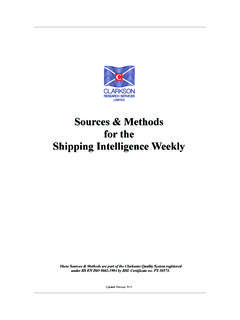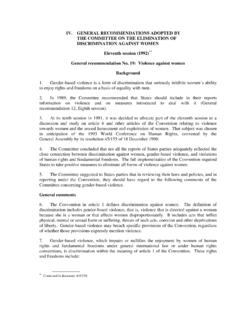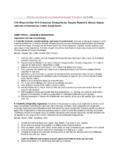Transcription of Swedish Research and Innovation Strategy for a ... …
1 Swedish Research and Innovation Strategy for a Bio-based EconomySwedish Research and Innovation Strategy for a Bio-based EconomySwedish Research and InnovationStrategy for a Bio-based EconomyReport: R3:2012 ISBN 978-91-540-6068-9 Graphic design: Lupo DesignCover: Magnus RietzPhoto credits: Page 4 Azote; page 8 Lars H gbom; page 12 John r; page 14 IBL Bildbyr ; page 17 Azote; page 18 Lupo Design; page 20 IBL Bildbyr ; page 22 Azote; page 25 John r; page 26 iStockphotos; page 31 John : March 2012, Edita AB3 Swedish Research and Innovation Strategy for a Bio-based EconomySwedish Research and Innovation Strategy for a Bio-based EconomySwedish Research and Innovation Strategy for a Bio-based Economy5On 8 September 2011 the Swedish Government commissio-ned Formas, in consultation with VINNOVA and the Swe-dish Energy Agency, to prepare a national Strategy for the gene-ration of a bio-based economy and sustainable development.
2 A dedicated steering group was established to manage the project, comprising Anna Ledin from Formas, (chair person), Jan Svensson and Sara sterman from Formas, Martin Svensson from VINNOVA and Svante S derholm from the Swedish Energy Agency. Magnus Brandel from MBenergi-strategi AB also served as the secretary of the steering group. Contacts have been made and discussions held with a large number of stakeholders connected with bioeconomy efforts, both in Sweden and abroad. 6 February 2012 Rolf AnnerbergDirector GeneralAnna LedinSecretary GeneralForewordRolf Annerberg Director GeneralAnna LedinSecretary GeneralSwedish Research and Innovation Strategy for a Bio-based Economy7 Foreword 5 Summary 9 Purpose and aim of the assignment 13 Background 13 Strategies for a bio-based and green economy in other countries 15 Methods used to perform the assignment 16 Definition of a bio-based economy 16 Challenges in converting to a bio-based economy 17 Bioeconomy value chain recycling that includes the ecosystem and the consumer 17 Domestic national potential resources, actors and development opportunities 20 Strategy for Research .
3 Development and 23innovation for a bio-based economyFocus and approach 23 Research and development initiatives 23 I. The replacement of fossil-based raw materials with bio-based raw materials 23 II. Smarter products and smarter use of raw materials 26 III. Change in consumption habits and attitudes 27 IV. Prioritisation and choice of measures 28 Innovation incentives 30 Need for coordination between Research funding bodies, researchers and commerce 33 ContentsSwedish Research and Innovation Strategy for a Bio-based EconomyWe have defined a bio-based economy (bioeconomy) as an economy based on: A sustainable production of biomass to enable increased use within a number of different sectors of society. The objective is to reduce climate effects and the use of fossil-based raw materials.
4 An increased added value for biomass materials, con-comitant with a reduction in energy consumption and recovery of nutrients and energy as additional end pro-ducts. The objective is to optimize the value and contribu-tion of ecosystem services to the analysis shows that Sweden, in comparison to many other countries, has good preconditions given by natural geographic conditions, traditional industry and infrastruc-ture for being able to convert to a bio-based economy. Con-verting from the use of fossil fuels to renewable resources can also confer an inherent increase in competition for raw materials. This also provides new opportunities to comple-ment traditional products with new products and services to maintain and improve Sweden s competitiveness.
5 In addition to the potential within the industrial sector that has long been based on agriculture and forestry, the development of a bioeconomy also offers inherent opportunities for increased use of biomass raw materials within other commercial sectors. This applies, for example, to the transport sector, the motor industry, the construction sector and the chemical have defined the following Research and development needs: The replacement of fossil-based raw materials with bio-based raw materialsSome examples of this are:Intensified production of bio-based raw materials, Nu-trient and fertilizer optimization systems, Crop and animal breeding, Cultivation system such asmulti-functional farming and forestry systems, Adaptation Summary9 The conversion to a bio-based economy means a transition from an economy that to a large extent has been based on fossil fuels to a more resource-efficient economy based on renewable raw materials that are produced through the sustainable use of ecosystem services from land and water.
6 Of seeds, crops and production systems to cope with climate change, New and improved biomass properties, Use of ecosystems other than fields and forests for bio-mass production, for example marine ecosystems or ur-ban environments. Smarter products and smarter use of raw materialsSome examples of this are:Further refinement of biomass products, Bi-products and waste products become raw materials, New pro-ducts, Biorefineries. Change in consumption habits and attitudesSome examples of this are:Increased product lifetimes, Increased recycling, More efficient transport, distribution and storage, New services, Consumer behaviour. Prioritisation and choice of measures Some examples of this are:Environmental consequences, Socio-economic conse-quences, Conflict of objectives, Governing and development must be complemented by inno vation-fostering initiatives and measures that specifi-cally address bioeconomy challenges.
7 The nature and ex-tent of these challenges necessitates widespread collabora-tion among actors and that sectors work together to be able to deal with the complex issues and demands for solutions that the challenges give rise includes: Stimulating cross-industry collaboration in Research and development in order to develop and implement solutions that contribute to a growing bio-based economy. Univer-sities and Research institutes play a central role in forging links in such collaborations, but public actors and civilian society also has important roles. Stimulating the growth of strong Research and Innovation environments that contribute with relevant knowledge and create preconditions for Innovation within the area.
8 These strong environments gather together Swedish com-petence and actors and augment the innovative capabili-ties of regions and organisations. Accelerating development, verification and commerciali-sation of new bio-based solutions and provide continued support for the demonstration of products, systems and services other than fuels and energy technology solutions. Offering support to small and medium-sized enter prises for the commercialisation of new technologies. This 10 Swedish Research and Innovation Strategy for a Bio-based Economy11particularly applies to collaborations between these and larger companies in order to accelerate development and Innovation . It is the opinion of Formas, VINNOVA and the Swedish Energy Agency that the organisation of the funding of Research , development and Innovation within the area of bioeconomy functions well.
9 Our analyses have however identified a need for the closer involvement of users/con-sumers in prioritising knowledge gaps and new problem areas. Formas will therefore establish a User Forum to func-tion as an advisory resource for those funding the of the work of implementing the Strategy can be carried out within the framework of existing resources. If a major new initiative in the area is to be implemented then additional resources will be required. This presupposes that there are re-sources for this in state finances. Swedish Research and Innovation Strategy for a Bio-based Economy13 Swedish Research and Innovation Strategy for a Bio-based EconomyBackground The conversion to a bio-based economy means a transition from an economy that to a large extent has been based on fossil materials to a more resource-efficient economy based on renewable raw materials.
10 These raw materials should be produced through the sustainable use of ecosystem services from land and water. To achieve this requires both new knowledge and better utilization of existing knowledge. The development of a bio-based economy will require new know-ledge that can only come from Research and development, as well as measures to foster Innovation that are linked to the Research and development. This applies also to the develop-ment of overarching and interdisciplinary knowledge about how to implement new technologies and new products into what is, to a large extent, a fossil-based 8 September 2011 the Government commissioned Formas, in consultation with VINNOVA and the Swedish Energy Agency to submit a proposal ( L2011/2399) for a natio-nal Strategy for the development of a bio-based economy (bioeconomy) and to propose a Swedish definition of the term.





